Cartoons at Bat (Part 21): A Few Foul Balls
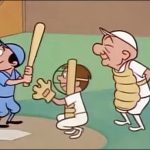

A random look today at various studios’ productions from the 1980’s and some of the 1990’s, not necessarily covering all the chronological bases in one breath, but merely finding enough material to fill one article’s content. We also take a brief step backwards, for another title to add to the lineup from the 1960’s, following below
We begin this week with an oversight from the 1960’s – and why not an oversight, considering that it’s Mr. Magoo. Base on Brawls (UPA, date unknown, circa 1960-62) finds Magoo on one of his usual jaunts through town, when he encounters on the street two sewer workers, oddly preparing rivets for use underground. (?) One of them in a manhole calls to the other at a rivet heater, “Throw me a hot one.” Magoo jumps to the typical presumption that these are neighborhood kids playing baseball – but sadly, forced to play in the street, having no formal place to play. Civic-minded Magoo decides to renovate a vacant lot into a ball park for the kids – not realizing the lot he is choosing is the site of the beginnings of construction of a skyscraper by his rich but evil uncle, Tycoon Magoo. Learning of his nephew’s activities, Tycoon calls upon his British manservant Worcestershire to evict Magoo from the lot permanently.
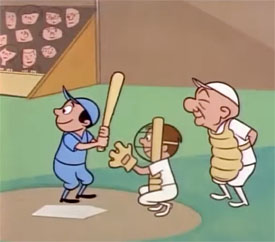 Magoo measures out the baselines by foot, treading on a teetering board with a sawhorse as a fulcrum. The board end flips up as Magoo walks over the center, whacking Worcestershire in the chin, headfirst into a girder above, and down into a cement mixer. Magoo attempts to find a place for a flagpole, but walks into an open pit. He believes the ground is too uneven, and the pitcher’s mound needs to be built up. That’s Worcestershire’s cue to use a small bulldozer to attempt to bury Magoo alive. But Magoo somehow comes out on top of the dirt instead of underneath it, and thanks the stranger for his help – but observes that the stranger is using a catcher’s mitt that is far too oversize for regulation (the shovel end of the bulldozer), and suggests it must be discarded at once. Magoo heads for high ground to observe how the field is shaping up, trotting out onto a beam of the skyscraper skeleton. Worcestershire attempts to knock Magoo off by swinging a girder at him suspended from a crane, but misses as Magoo ducks. down for a closer look below. Magoo steps off the beam anyway, bit is caught after a short fall upon a load of lumber being lowered by another crane. Magoo remarks that those steps are far too tall for the tiny tots, but these minor wrinkles can be ironed out as the development progresses. Finally, Magoo encounters the bulldozer, and thinks someone left a golf cart on the lot. Best get rid of it before the duffers decide to make competing use of the land. Magoo begins driving it, but runs smack into a main support girder for the building skeleton. A tree in the middle of the infield? Well, time to yell. “Timber”. Magoo repeatedly smacks at the girder with his vehicle, and Worcestershire above can see it’s time to abandon ship. The butler jumps off the building, using an umbrella as a parachute, as girders and boards rain down around him from the collapsing structure.
Magoo measures out the baselines by foot, treading on a teetering board with a sawhorse as a fulcrum. The board end flips up as Magoo walks over the center, whacking Worcestershire in the chin, headfirst into a girder above, and down into a cement mixer. Magoo attempts to find a place for a flagpole, but walks into an open pit. He believes the ground is too uneven, and the pitcher’s mound needs to be built up. That’s Worcestershire’s cue to use a small bulldozer to attempt to bury Magoo alive. But Magoo somehow comes out on top of the dirt instead of underneath it, and thanks the stranger for his help – but observes that the stranger is using a catcher’s mitt that is far too oversize for regulation (the shovel end of the bulldozer), and suggests it must be discarded at once. Magoo heads for high ground to observe how the field is shaping up, trotting out onto a beam of the skyscraper skeleton. Worcestershire attempts to knock Magoo off by swinging a girder at him suspended from a crane, but misses as Magoo ducks. down for a closer look below. Magoo steps off the beam anyway, bit is caught after a short fall upon a load of lumber being lowered by another crane. Magoo remarks that those steps are far too tall for the tiny tots, but these minor wrinkles can be ironed out as the development progresses. Finally, Magoo encounters the bulldozer, and thinks someone left a golf cart on the lot. Best get rid of it before the duffers decide to make competing use of the land. Magoo begins driving it, but runs smack into a main support girder for the building skeleton. A tree in the middle of the infield? Well, time to yell. “Timber”. Magoo repeatedly smacks at the girder with his vehicle, and Worcestershire above can see it’s time to abandon ship. The butler jumps off the building, using an umbrella as a parachute, as girders and boards rain down around him from the collapsing structure.
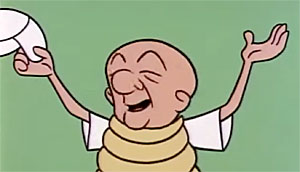 His umbrella turns inside out, and he plummets into a tall pile of dirt below, as boards continue to fall, constructing the shape of spectator bleachers around him. Worcestershire remains protruding between the boards, with his inverted umbrella bent to look like a pennant flag of a fan in the stands. Magoo informs this eager beaver that the season doesn’t open until next week, and he’ll have to come back then. The scene changes to the following week, with a ball park actually constructed upon the lot. Magoo himself presides over the little league game, as umpire! (?????) Talk about your proverbial blind-as-a-bat, as Magoo spots a pigeon flying low over home plate, and shouts out a call of “Strike three!” without a ball being pitched. The spectators loudly boo him, but Magoo hears it differently, thinking they are chanting, “Magoo”. “They love me” concludes Magoo, concluding the cartoon.
His umbrella turns inside out, and he plummets into a tall pile of dirt below, as boards continue to fall, constructing the shape of spectator bleachers around him. Worcestershire remains protruding between the boards, with his inverted umbrella bent to look like a pennant flag of a fan in the stands. Magoo informs this eager beaver that the season doesn’t open until next week, and he’ll have to come back then. The scene changes to the following week, with a ball park actually constructed upon the lot. Magoo himself presides over the little league game, as umpire! (?????) Talk about your proverbial blind-as-a-bat, as Magoo spots a pigeon flying low over home plate, and shouts out a call of “Strike three!” without a ball being pitched. The spectators loudly boo him, but Magoo hears it differently, thinking they are chanting, “Magoo”. “They love me” concludes Magoo, concluding the cartoon.
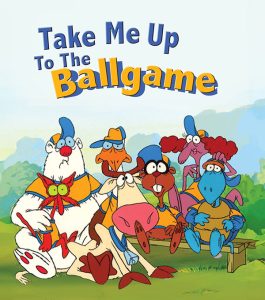 strong>Take Me Up To the Ball Game (9/18/80) was a one-shot special out of left field from Nelvana, predating Alf’s efforts to depict baseball on another planet, by moving the playing field to an intergalactic league somewhere in space. The special’s most notable feature is perhaps its casting of a well-known celebrity in what may have been his only voice-over role. The persona of Phil Silvers, TV’s famous Sgt. Bilko, had been impersonated in many cartoon forms, particularly by Hanna-Barbera, in such varied roles as a Snorkasaurus in The Flintstones, con-artist Hokey Wolf, and equally conniving Top Cat, whose show was an admitted rip-off modeled after the Sgt. Bilko TV series, even borrowing one of its principal cast members (Maurice Gosfield, formerly Private Doberman). But here, finally, Silvers gets to essentially portray himself in alien form, as a crafty minion on assignment to round up any available baseball talent from any planet to compete in the championship playoffs – and make some quick bucks on the side for himself in the process. A role right up Silvers’ alley.
strong>Take Me Up To the Ball Game (9/18/80) was a one-shot special out of left field from Nelvana, predating Alf’s efforts to depict baseball on another planet, by moving the playing field to an intergalactic league somewhere in space. The special’s most notable feature is perhaps its casting of a well-known celebrity in what may have been his only voice-over role. The persona of Phil Silvers, TV’s famous Sgt. Bilko, had been impersonated in many cartoon forms, particularly by Hanna-Barbera, in such varied roles as a Snorkasaurus in The Flintstones, con-artist Hokey Wolf, and equally conniving Top Cat, whose show was an admitted rip-off modeled after the Sgt. Bilko TV series, even borrowing one of its principal cast members (Maurice Gosfield, formerly Private Doberman). But here, finally, Silvers gets to essentially portray himself in alien form, as a crafty minion on assignment to round up any available baseball talent from any planet to compete in the championship playoffs – and make some quick bucks on the side for himself in the process. A role right up Silvers’ alley.
The intergalactic baseball commissioner has a problem. The season, and the championship playoff, may need to be cancelled, as none of the other league teams are willing to face the current league-leading All-Stars, of which they are all too afraid. The team has never lost a game – in fact, never even been scored against. Silvers (as the alien Erwin – but for here, I’ll refer to him by his own name), with the assistance of two intergalactic taxi drivers, is sent to scour the universe for any team he can find willing to compete in the playoff, so that the game can go on and a batting champion be officially crowned without a disappointing forfeit. Silvers’ eyes fall upon a little-league team of animals from Earth. Their pitcher, an eagle, is busy quarreling with the team manager, a beaver, over whether to keep or ditch a team member simply known as Cat who always forgets to field the ball each time he encounters a stray flower or plant to smell. The eagle says they’ll never win as long as Cat stays on the roster, but the Beaver insists it’s only fair that he be allowed to play. Enter the approach of the saucer-taxi, which looms over the team, casting a giant shadow upon them, and beeps out musical signals much like “Close Encounters”, but matching the opening notes of “Take Me Out To the Ball Game”. The two drivers stick their heads out the window, and ask if anyone wants to play baseball. They are a little slow in recognizing what an eligible Earthing looks like, choosing over the team a herd of cows to beam up, then realizing their mistake when all that the captured earthlings can say is “Moo”. The cows are ejected (save one stowaway), via a spiral slide-ramp, and the real tea, beamed up in their place.
Silvers introduces himself as a promoter, and asks if they are up for a friendly little interstellar game. He asks to make sure they are a baseball team, and the eagle responds, “That s a matter of opinion.” But Silvers is impressed when he finds the name of the team is the “Giants”, and thinks he can see possibilities for these guys. He promises they will be home in time for dinner, and says their destination is not far – as space goes. He further promises. “All expenses paid”, then holds that thought, changing it to “Most expenses paid.”
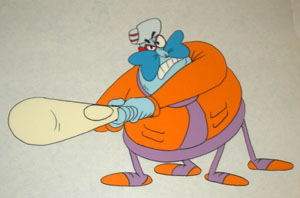 Silvers attends a press conference, while the team is beamed into a back room to which the two drivers immediately seal the door with padlocks and chains after Silvers exits. When the team asks why the security, the drivers ad lib, “It’s a lock-er room.” At the conference, Silvers builds on the imaginations of the press as to the physical appearance of the “Giants”, claiming they are too shocking to disclose to the press at this time – especially when the team hasn’t eaten yet. He gives them, however, a “rough” idea of the players’ appearance, by drawing them a picture – in which he combines into one character the total features and appendages of nine separate players on one body, producing a drawing of a multi-eyed, multi-armed, multi-legged hideous monster. The Commissioner promises everyone that this will be the game of the century. Silvers meanwhile makes sure to get every cent he can muster bet upon the All-Stars, as the betting odds go up in favor of Earth.
Silvers attends a press conference, while the team is beamed into a back room to which the two drivers immediately seal the door with padlocks and chains after Silvers exits. When the team asks why the security, the drivers ad lib, “It’s a lock-er room.” At the conference, Silvers builds on the imaginations of the press as to the physical appearance of the “Giants”, claiming they are too shocking to disclose to the press at this time – especially when the team hasn’t eaten yet. He gives them, however, a “rough” idea of the players’ appearance, by drawing them a picture – in which he combines into one character the total features and appendages of nine separate players on one body, producing a drawing of a multi-eyed, multi-armed, multi-legged hideous monster. The Commissioner promises everyone that this will be the game of the century. Silvers meanwhile makes sure to get every cent he can muster bet upon the All-Stars, as the betting odds go up in favor of Earth.
Time for the game quickly approaches, and the galactic spectators, their interest peaked by the descriptions of the Earth team, pack the stadium to see the spectacle. The Earth players enter through a giant portcullis door, leading the fans to expect something appropriately ferocious. The first out the door is the cow who stowed away. This is about as terrifying a vision as the spectators get, and sends them scrambling behind their seats. But when the real players show their faces, fan sentiment changes from terror to humiliating laughter. Even the Commissioner remarks to Silvers, “They’re so small.” Silvers responds that they are wearing clever disguises to make themselves look little and fool the opponents. The Commissioner can only respond, “That’s a very good disguise.”
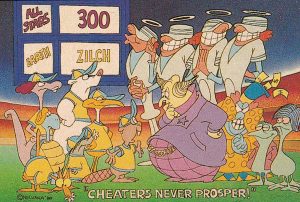 A bear from the Earth team steps up as the first batter. One pitch, and the bear pops a high fly into center field. The ball, however, has a special surprise, and divides into three balls. Three fielders stand underneath, catching each in a one-two-three manner. One batter – three outs. The beaver’s jaw nearly dops off his face, realizing this team plays by its own rules – or lack thereof. The eagle is all for countering with his own style of cheating, but the beaver insists that they’re all representing Earth – and Earth plays the honest way. This is little consolation for the eagle, who finds even the balls he is given to pitch are rigged in the All-Stars’ favor. The first batter’s fly ball rises to the very top of the domed stadium, then drops rapidly, converting into the shape of a falling aerial bomb. The Cat fielder underneath digs a protective foxhole in the infield for himself, dons a soldier’s protective helmet, and waves a white flag instead of attempting to catch the falling projectile. Realizing it is unopposed, the bomb transforms back into a ball again, and lands uncaught at the edge of the foxhole.
A bear from the Earth team steps up as the first batter. One pitch, and the bear pops a high fly into center field. The ball, however, has a special surprise, and divides into three balls. Three fielders stand underneath, catching each in a one-two-three manner. One batter – three outs. The beaver’s jaw nearly dops off his face, realizing this team plays by its own rules – or lack thereof. The eagle is all for countering with his own style of cheating, but the beaver insists that they’re all representing Earth – and Earth plays the honest way. This is little consolation for the eagle, who finds even the balls he is given to pitch are rigged in the All-Stars’ favor. The first batter’s fly ball rises to the very top of the domed stadium, then drops rapidly, converting into the shape of a falling aerial bomb. The Cat fielder underneath digs a protective foxhole in the infield for himself, dons a soldier’s protective helmet, and waves a white flag instead of attempting to catch the falling projectile. Realizing it is unopposed, the bomb transforms back into a ball again, and lands uncaught at the edge of the foxhole.
After one full inning, the All-Stas have been held to 99 runs on 67 hits, with 13 errors by Earth. A musical montage continues to show the All-Stars chalking up hundreds of runs, with Earth still scoreless. Silvers assists in the cheating, aiding the All-Stars with a trap-door under one of the bases (delivering the advancing Earth runners by chute back to the dugout), robotic feet out of the baselines to trip runners up, and a brick wall rising out of the sand just before home plate to prevent the Beaver from scoring. The eagle once again declares to the Beaver that it’s time to show these guys that they can cheat back, but the Beaver holds firm that they can’t do so. The Commissioner, seeing things going so far contrary to the advance hype raised for the Earth team, calls a time out, and addresses the Earthlings at the dugout, asking why they’re not giving the All-Stars much of a challenge. “Because they cheat”, responds the Beaver, who says Earth players follow the rules. The Commissioner responds that their league teams haven’t followed rules for hundreds of years – indicating that their methods must be more advanced than those of Earth. The Beaver reaches the breaking point when even the stadium announcer (a character who is half-man, half-microphone), asks them why they will not cheat. Yelling into the microphone man, the Beaver responds, “Because cheaters NEVER PROSPER!!!” Spontaneous laughter rises from everyone in the stands, on the opposing team, and even from the announcer, who remarks to the listening audience, “You heard it here first, folks!”
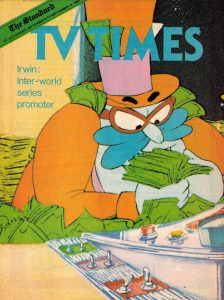 Cat’s turn at bat arrives. He has been hitless all day as usual. But, in dropping his bat, Cat bends over to retrieve it, and accidentally hits the ball with his tail. Cat is so unused to having the opportunity for base running, he at first runs the wrong way, toward third. By the time he gets turned around, the All-Stars are “laughing their heads off” – literally – as they seem to be part-robotic, with the upper half of their heads detaching at the jaw line and falling to the ground, leaving them temporarily eyeless to make the tag on Cat. Cat manages in a shuffling walk resembling Marvin the Martian to sneak his way between the legs of the second baseman, and around the third baseman, and finds himself heading for home. The third baseman lifts the baseline off the ground as if it was made of rope, and gives it a lifting pull upwards, sending a wave generated through it.
Cat’s turn at bat arrives. He has been hitless all day as usual. But, in dropping his bat, Cat bends over to retrieve it, and accidentally hits the ball with his tail. Cat is so unused to having the opportunity for base running, he at first runs the wrong way, toward third. By the time he gets turned around, the All-Stars are “laughing their heads off” – literally – as they seem to be part-robotic, with the upper half of their heads detaching at the jaw line and falling to the ground, leaving them temporarily eyeless to make the tag on Cat. Cat manages in a shuffling walk resembling Marvin the Martian to sneak his way between the legs of the second baseman, and around the third baseman, and finds himself heading for home. The third baseman lifts the baseline off the ground as if it was made of rope, and gives it a lifting pull upwards, sending a wave generated through it.
But Cat maintains his balance on the line like a circus performer. Silvers’ brick wall rises in front of home plate, but Cat turns his shuffle at a vertical right angle, walking up and over the wall, and narrowly avoiding a throw of the ball by the third baseman attempting to hit him in the back. Cat scores the first run ever scored against the All-Stars. From here on, the rest of the team becomes inspired, and also seems to find ways to outwit the All-Stars’ gadgets and traps by playing fairly (for example, a kangaroo player avoids a fall into the first-base trap door by jumping upon the bag instead of sliding into it, slamming the trap door shut). The team catches up, and takes a lead of one run. The home team All-Stars come up in the bottom of the ninth, loading the bases, but can’t get the needed runs across. Down to their last at-bat, a self-appointed pinch-hitter appears at the plate, intent on protecting his bets – Silvers. Silvers has been sweating bullets throughout the turn of events as he watched the game from the Commissioner’s box, and even called the intergalactic airport, trying to book a quick flight out to Argentina. Now, he faces the eagle pitcher with teeth gritted, determined to score the needed hit. Two strikes elude him, tangling up his four legs in scrambled knots. Finally he connects, straight up through the center hole of the domed stadium roof. The Earth team scrambles all over the field, trying to get under a ball they can’t even see. The ball finally begins to descend, as the Earth team climbs one atop another to form an animal tower, in hopes of making the catch. Cat, however, is not part of the tower, having found another flower growing out of the infield dirt to smell. The ball descends into the mitt of the top player of the living tower – but bounces out of his mitt. But, by sheer dumb luck, Cat’s mitt hand is extended below, as Cat bends low to smell the flower, and the ball is caught by him without even trying. Earth wins – just as Silvers’ brick wall springs up from the dirt without Silvers’ assistance, causing him to crash face-first into it and collapse just short of the plate. The Earthers receive the intergalactic trophy and the hails of the crowd, and the taxi drivers remind them it’s time for the return flight home if they don’t want to miss dinner. As for Silvers? We are never shown precisely what happens to him and his gambling debts, but, knowing the lack of ethics of this alien civilization, we can only surmise that the results won’t be pretty.
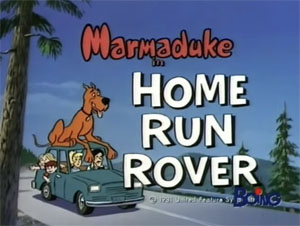 The premiere episode of “Heathcliff and Marmaduke” foretold that the screen career of the gangly comic strip hound would be short-lived. Home Run Rover (Ruby-Spears, 9/12/81) has Marmaduke allowed to attend a little league game as the team mascot. He of course makes the expected nuisance of himself, running onto the field at the call of “Play ball”, attempting to prevent a runner from stealing a base (thinking he’s a thief), by chomping onto the bag and playing tug of war with the runner until the bag rips, and even pantomiming argument with his owner as umpire over a call. Available copy of the film contains two downloading glitches where scenes of the episode are missing, so it’s not entirely certain how the team for which the hound roots loses its putcher – but somehow, for lack of a substitute, Marmaduke is called upon to pitch, with his tail. Most of the baseball action uses old hat, time worn gags (ball makes hole through glove, toss a kid into air to make a catch, whirling corkscrew pitch that makes batter’s eyes roll), finally ending with another oldie, as Marmaduke bats a single, then has to push one of the family kids from first to second, placing himself off the base. But he avoids being tagged by using the old Terry bit of digging a tunnel under the baselines, to get himself and the child underground to home plate for the winning runs. There are no genuine laughs here, and no points for originality. Another Scooby Doo, Marmaduke was not.
The premiere episode of “Heathcliff and Marmaduke” foretold that the screen career of the gangly comic strip hound would be short-lived. Home Run Rover (Ruby-Spears, 9/12/81) has Marmaduke allowed to attend a little league game as the team mascot. He of course makes the expected nuisance of himself, running onto the field at the call of “Play ball”, attempting to prevent a runner from stealing a base (thinking he’s a thief), by chomping onto the bag and playing tug of war with the runner until the bag rips, and even pantomiming argument with his owner as umpire over a call. Available copy of the film contains two downloading glitches where scenes of the episode are missing, so it’s not entirely certain how the team for which the hound roots loses its putcher – but somehow, for lack of a substitute, Marmaduke is called upon to pitch, with his tail. Most of the baseball action uses old hat, time worn gags (ball makes hole through glove, toss a kid into air to make a catch, whirling corkscrew pitch that makes batter’s eyes roll), finally ending with another oldie, as Marmaduke bats a single, then has to push one of the family kids from first to second, placing himself off the base. But he avoids being tagged by using the old Terry bit of digging a tunnel under the baselines, to get himself and the child underground to home plate for the winning runs. There are no genuine laughs here, and no points for originality. Another Scooby Doo, Marmaduke was not.
• Watch this episode on DailyMotion.
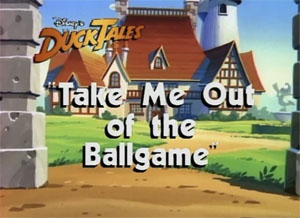 Take Me Out of the Ball Game (Disney, Ducktales, 11/30/87) was, I believe, the only instance in the series where two short stories were presented instead of one full-length episode. The Junior Woodchucks have a little league championship game today, against a team organized by Ma Beagle for the junior members of the Beagle family, known as the Beagle Brats. Before the eager Woodchucks head for the field, there is a snag. Launchpad suggests that Scrooge break the news, as he doesn’t have the stomach to break the kids’ hearts. Scrooge needs to make an emergency flight to Paris, and the flying services of Launchpad (the coach of the Woodchuck team) are needed. Scrooge apologizes that if there’d been any other pilot available, Scrooge would have chosen him gladly. League rules require the team to have a coach, so someone needs to help the kids or they’ll forfeit the championship. Scrooge thus delegates his butler Duckworth. The British manservant reacts with uncharacteristic surprise. “Me? Coach baseball? That’s not cricket!”
Take Me Out of the Ball Game (Disney, Ducktales, 11/30/87) was, I believe, the only instance in the series where two short stories were presented instead of one full-length episode. The Junior Woodchucks have a little league championship game today, against a team organized by Ma Beagle for the junior members of the Beagle family, known as the Beagle Brats. Before the eager Woodchucks head for the field, there is a snag. Launchpad suggests that Scrooge break the news, as he doesn’t have the stomach to break the kids’ hearts. Scrooge needs to make an emergency flight to Paris, and the flying services of Launchpad (the coach of the Woodchuck team) are needed. Scrooge apologizes that if there’d been any other pilot available, Scrooge would have chosen him gladly. League rules require the team to have a coach, so someone needs to help the kids or they’ll forfeit the championship. Scrooge thus delegates his butler Duckworth. The British manservant reacts with uncharacteristic surprise. “Me? Coach baseball? That’s not cricket!”
The kids tell Duckworth he needs to show up in a uniform. The best Duckworth can muster up is his old golfing outfit. The Beagles’ team is already on the field, completing warm-up. Ma Beagle, upon seeing the new Coach substitute, remarks that at first she was worried at the thought of someone new coming in – but this one looks even more stupid than Launchpad. The Brats head for their dugout with exchange of banter between them as to how they’re gonna “murderize” these guys, and Duckworth, hearing milder but similar-themed reactions from his own team, resolves that his players must be taught some lessons in the fine art of manners. This becomes a stronger resolve when Duckworth observes one of the nephews trying to “steal” a base. Duckworth steps onto the field, and orders the nephew back to first, allowing a Beagle to tag him out the second he steps off the bag. Duckworth also interferes with another of the nephews as he tries to slide into third for a triple – frowning on the duckling getting his uniform so filthy, and picking him up for a dusting while the baseman again tags him out as off the bag. Duckworth also won’t permit Webigail to engage in “climbing the fence like a monkey” to keep the Beagles’ hits from going over the fence.
The score mounts quickly in the Beagles’ favor, but even with a hefty lead, Ma Beagle isn’t going to take any chances, and reminds her team of the family tradition – always cheat. Thus, the Beagle pitcher employs for the rest of the game the family’s own invention – the Beagle Ball – a key-wound, somewhat lopsided sphere that zigs and zags all over the place, leaving the Woodchucks that face it hitless. The usual bottom of the ninth arrives, with the team’s cause appearing hopeless. Duckworth again remarks to a player that something “isn’t cricket.” One of the nephews explodes with frustration, yelling in Duckworth’s face, “Of course it isn’t cricket – – – it’s BASEBALL!!!”
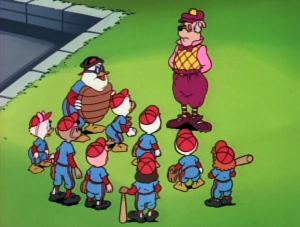 Webigail informs Duckworth that sliding, stealing, and climbing the fence are all parts of the game. Duckworth still doesn’t quite get the message, but admits that he may have been looking at things all wrong. So he proposes a different approach for the final inning – address the ball as if they were playing golf – a sport he understands. The kids think he’s still cracked – but to their amazement, the strategy works, and seemingly the whole lineup is now able to get under the mechanical ball with their golf-swings, and drive the ball repeatedly out of the park. It is not made clear whether Ma Beagle has an infinite supply of these wind-up balls, or whether the Beagles are somehow retrieving the ball each time it goes over the fence, but by some means, the pitcher still has it, as a situation arises with the three nephews all on base, and a home run needed to win. But who is the last batter due up to the plate? Doofus, the fat, clumsy duckling, who hasn’t had a ht all day. Will Duckworth’s golf strategy be enough to break this streak? It doesn’t look likely, as Doofus swings and miserably misses the first two pitches. On the second strike, Doofus’s glasses fly off, and the Beagle catcher offers to “help” him find them – by stepping upon and shattering them. The nephews know they are doomed, as, without his glasses, Doofus can hardly see the plate. But Duckworth has one more strategy idea in his now-percolating brain. He shouts out to Doofus to imagine that the ball is a “great gooey cream puff”. “What an idea”, responds Doofus, and as the blurry ball flies toward him, Doofus’s imagination transforms it to a crystal-clear image of the desirable pastry. One swing – and the game is won for the Woodchucks. Not only that, but the ball continues to soar skyward, zooming past even passing birds. While the team celebrates in the States, our attention shifts to Paris, where Launchpad is maneuvering Scrooge’s helicopter for a final approach toward the airport. Suddenly, what should enter through the cockpit window and conk Launchpad on the head, but the Beagle Ball Doofus clouted. Launchpad temporarily blacks out, and the copter, with Scrooge and LP inside, crashes and sinks into the River Seine. Scrooge and Launchpad come up floating on the surface, along with the misshapen Beagle Ball. Launchpad picks it up from the water, and remarks, “Gee. They sure use a funny-looking baseball in Europe.”
Webigail informs Duckworth that sliding, stealing, and climbing the fence are all parts of the game. Duckworth still doesn’t quite get the message, but admits that he may have been looking at things all wrong. So he proposes a different approach for the final inning – address the ball as if they were playing golf – a sport he understands. The kids think he’s still cracked – but to their amazement, the strategy works, and seemingly the whole lineup is now able to get under the mechanical ball with their golf-swings, and drive the ball repeatedly out of the park. It is not made clear whether Ma Beagle has an infinite supply of these wind-up balls, or whether the Beagles are somehow retrieving the ball each time it goes over the fence, but by some means, the pitcher still has it, as a situation arises with the three nephews all on base, and a home run needed to win. But who is the last batter due up to the plate? Doofus, the fat, clumsy duckling, who hasn’t had a ht all day. Will Duckworth’s golf strategy be enough to break this streak? It doesn’t look likely, as Doofus swings and miserably misses the first two pitches. On the second strike, Doofus’s glasses fly off, and the Beagle catcher offers to “help” him find them – by stepping upon and shattering them. The nephews know they are doomed, as, without his glasses, Doofus can hardly see the plate. But Duckworth has one more strategy idea in his now-percolating brain. He shouts out to Doofus to imagine that the ball is a “great gooey cream puff”. “What an idea”, responds Doofus, and as the blurry ball flies toward him, Doofus’s imagination transforms it to a crystal-clear image of the desirable pastry. One swing – and the game is won for the Woodchucks. Not only that, but the ball continues to soar skyward, zooming past even passing birds. While the team celebrates in the States, our attention shifts to Paris, where Launchpad is maneuvering Scrooge’s helicopter for a final approach toward the airport. Suddenly, what should enter through the cockpit window and conk Launchpad on the head, but the Beagle Ball Doofus clouted. Launchpad temporarily blacks out, and the copter, with Scrooge and LP inside, crashes and sinks into the River Seine. Scrooge and Launchpad come up floating on the surface, along with the misshapen Beagle Ball. Launchpad picks it up from the water, and remarks, “Gee. They sure use a funny-looking baseball in Europe.”
• The Ducktales episode is on Dailymotion in a good print as second story of a half-hour.
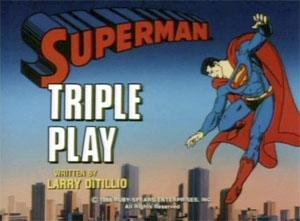 Triple Play (Ruby-Spears, Superman, 10/22/88). I’m not even sure what the title is supposed to refer to, as there don’t seem to be three characters or plot points in the story to account for it. Nor am I quite sure I know exactly what happened out of this watered-down script. The Prankster is on a senseless rampage, ostensibly with the intention of getting vengeance upon a judge who sent him up to prison, and humiliating Superman. As a side angle, he seems to have a grudge about the fact that he was not able to follow baseball during his incarceration, and thus mixes baseball into his so-called master plan. Two henchmen are sent to install a device within the stadium where the World Series will be held, and are forced to spray a security guard with knock-out gas while making their escape. Clark Kent, at the stadium with Jimmy Olsen to cover practice session of the home team, hears the guard’s calls for backup with his super-hearing, and spots the situation within the stadium with x-ray vision. He creates a diversion to duck away, using super-breath to stir up a massive dust cloud as a runner slides home, allowing him to make his costume change while vision is obliterated. The two minions spot Superman’s supposed entrance from the sky, and one of them pills out a bazooka. The other tells him it’s useless to use such a weapon on Superman, but the first bad guy says he’s not aiming for the Man of Steel. Instead, he shoots out the underpinnings of a bank of stadium lighting, causing the teetering structure to crack, with a fall imminent upon the players on the field. This is enough to divert Superman’s attention, as he catches the fixtures before they can hit the ground, using the stadium batting cage as a net to catch the lights. The bad guys make their getaway.
Triple Play (Ruby-Spears, Superman, 10/22/88). I’m not even sure what the title is supposed to refer to, as there don’t seem to be three characters or plot points in the story to account for it. Nor am I quite sure I know exactly what happened out of this watered-down script. The Prankster is on a senseless rampage, ostensibly with the intention of getting vengeance upon a judge who sent him up to prison, and humiliating Superman. As a side angle, he seems to have a grudge about the fact that he was not able to follow baseball during his incarceration, and thus mixes baseball into his so-called master plan. Two henchmen are sent to install a device within the stadium where the World Series will be held, and are forced to spray a security guard with knock-out gas while making their escape. Clark Kent, at the stadium with Jimmy Olsen to cover practice session of the home team, hears the guard’s calls for backup with his super-hearing, and spots the situation within the stadium with x-ray vision. He creates a diversion to duck away, using super-breath to stir up a massive dust cloud as a runner slides home, allowing him to make his costume change while vision is obliterated. The two minions spot Superman’s supposed entrance from the sky, and one of them pills out a bazooka. The other tells him it’s useless to use such a weapon on Superman, but the first bad guy says he’s not aiming for the Man of Steel. Instead, he shoots out the underpinnings of a bank of stadium lighting, causing the teetering structure to crack, with a fall imminent upon the players on the field. This is enough to divert Superman’s attention, as he catches the fixtures before they can hit the ground, using the stadium batting cage as a net to catch the lights. The bad guys make their getaway.
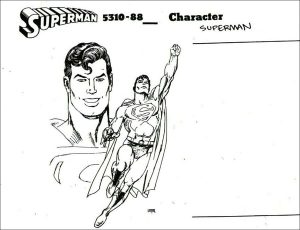 Lois insists on the assignment of covering the next day’s World Series game to watch for trouble. Clark instead chooses to cover an art gallery unveiling that night, featuring works of modern art owned by the judge who sent the Prankster up – on a hunch these might be a target for the Prankster’s weird sense of humor. Clark’s hunch proves right, and a considerable amount of footage is wasted on a chase through the museum, in which Superman seems to be allowed practically nothing super to do, standards and practices apparently preventing him from laying a blow upon the bad guys. The Prankster makes off with some paintings (providing no advancement to the overall plot), but also some artistically-designed modern robots. In a scene that amounts to nothing, the judge is seen tied to an op-art machine of some sort, while the Prankster states that he doesn’t get mad – he gets even. The Prankster presses a button activating the machine, bit what we think will amount to some sort of a death trap does absolutely nothing but to vibrate the judge like a coin-operated hotel bed.
Lois insists on the assignment of covering the next day’s World Series game to watch for trouble. Clark instead chooses to cover an art gallery unveiling that night, featuring works of modern art owned by the judge who sent the Prankster up – on a hunch these might be a target for the Prankster’s weird sense of humor. Clark’s hunch proves right, and a considerable amount of footage is wasted on a chase through the museum, in which Superman seems to be allowed practically nothing super to do, standards and practices apparently preventing him from laying a blow upon the bad guys. The Prankster makes off with some paintings (providing no advancement to the overall plot), but also some artistically-designed modern robots. In a scene that amounts to nothing, the judge is seen tied to an op-art machine of some sort, while the Prankster states that he doesn’t get mad – he gets even. The Prankster presses a button activating the machine, bit what we think will amount to some sort of a death trap does absolutely nothing but to vibrate the judge like a coin-operated hotel bed.
With the judge rescued, but the crooks escaped again, the scene changes to the World Series’ game next day, where Superman, for rescuing the players the previous day, has been asked to throw out the first pitch. Lois and Jimmy cover the event, while Clark dodges out on the pretense of obtaining refreshments for all, allowing him to show up in cape on the field. Suddenly, the unthinkable (and entirely unexplained) happens. A ray emits from the location where the Prankster’s thugs had been working on installation, and suddenly, the two teams, the playing field, and Lois and Jimmy thereon, all vanish into thin air, before Superman’s eyes. They materialize as if from a transporter of the starship Enterprise upon a remote island, where the Prankster has set up his own personal baseball diamond. The Prankster orders one of his minions to send word to Superman inviting him to this little party – but to come alone.
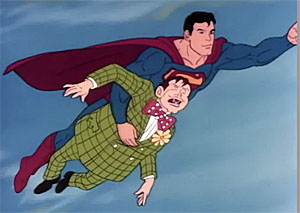 Arriving at the island, Superman confronts the Prankster, asking what it is he wants. The Prankster reveals two mammoth skyrockets. To the first is tied the judge, though no explanation is offered as to how he was captured and brought there. To the other rocket are tied Lois and Jummy (who covered Prankster’s arrest and capture by Superman, so the Prankster doesn’t like them either). The Prankster warns Superman not to attempt a rescue, or he will press the buttons of a remote to explode both rockets at the same time. The Prankster tells of having been deprived of following baseball – so he has decided to stage his own personal World Series – the combined two contending teams against an army of the robots he hijacked from the museum, which he has reprogrammed as baseball-playing dynamos. And just to keep the odds even, Superman is to pitch for the robot team. If the robots win, the Judge’s rocket will be fired off to explode. If the humans win, Lois and Jimmy’s rocket will be fired off. Either way, Superman loses.
Arriving at the island, Superman confronts the Prankster, asking what it is he wants. The Prankster reveals two mammoth skyrockets. To the first is tied the judge, though no explanation is offered as to how he was captured and brought there. To the other rocket are tied Lois and Jummy (who covered Prankster’s arrest and capture by Superman, so the Prankster doesn’t like them either). The Prankster warns Superman not to attempt a rescue, or he will press the buttons of a remote to explode both rockets at the same time. The Prankster tells of having been deprived of following baseball – so he has decided to stage his own personal World Series – the combined two contending teams against an army of the robots he hijacked from the museum, which he has reprogrammed as baseball-playing dynamos. And just to keep the odds even, Superman is to pitch for the robot team. If the robots win, the Judge’s rocket will be fired off to explode. If the humans win, Lois and Jimmy’s rocket will be fired off. Either way, Superman loses.
Superman cooperates, waiting his chance at the Prankster. He tosses pitches punching holes in opponent’s bats. He jumps 300 feet into the air to make dazzling catches. But the pros manage to keep pace with the robots, bringing Superman up to bat for the robots. The Prankster sends his men to the plate with a message for Superman – hit a homer, or else. Before they can return to shield the Prankster at his throne seat, Superman steps up to the plate, and instead delivers a powerful bunt. It ricochets off a tree trunk on the edge of the field, and bounces back toward the Prankster’s throne, knocking the remote from his hand and into the air. Before it can come down, Superman turns his heat vision upon the remote, disintegrating the device. The Prankster’s efforts to use a huge motorized pitching/catching wagon seem entirely wasted knowing the Man of Steel’s power, and Superman can only react to being hit by a barrage of bats with the remark, “You’ve got to be kidding.” The Prankster is thus easily captured, the stadium field flown back to Metropolis, and Superman finally gets to toss out the first pitch. Despite the fact that all of these events must have taken considerable time to elapse, it appears that the crowds are still seated in the stadium. (Were they told to wait, with the game not officially called? Or is this supposed to be another day?) Lois and Jimmy are still watching the game, as Clark finally returns with the food. (Boy, does he take a long time!) He is told that he missed Superman, but seems content that he is in time for the start of regulation play. After all, some things are even more important than Superman.
• “Triple Play” is on ok.ru
This Babe Ruth BABE is a DUDE, dude (Hanna-Barbera, Bill & Ted’s Excellent Adventures, 11/24/90) – I’m not too familiar with this franchise, having never seen the live-action feature from where it began, and never having followed the series. So I have no real idea from where this super-cool genius Rufus materializes with his phone-booth time machine, and why he lets these two radical teenagers wander all over the space-time continuum as they please, signaling the device just by pantomiming the strumming of electric guitars. I also would never have had any idea that the first season of this show originated from Hanna-Barbera, as its visual style looks about as unlike any other known Hanna-Barbera product as humanly possible. (The second season wasn’t even produced by them, but handed over to DIC.) But, I have to admit, although I was not into shows about radical teenagers (the same reason I had no interest in “Beavis and Butthead”), that the writing of this one seems somewhat creative, even if the plotline wanders considerably, mostly for the purpose of filling the allotted time.
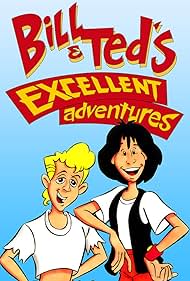 The trouble begins when Bill and Ted wind up in detention under their gym coach, who orders them to clean up a wall rack of sports trophies in the hall corridor. He tells them to take special care of a particular one, upon the top of which rests a baseball autographed by Babe Ruth. The boys bumble the handling of the trophies, knocking them out of the display rack, and performing acrobatics similar to Tom the Cat to catch all of the falling trophies on their extended appendages. But one item eludes their grasp – the baseball. One of our heroes (I’m not quite sure who is who) isn’t worried, because baseballs don’t break. But the ball rolls into the gym shower room, and settles face down in a large puddle of soapy water. I frankly think we should give more credit to the manufacturers of 70-year-old fountain pen ink for producing something that should be indelible after being dried for all that time on horsehide – but for some reason here, the soap is such a powerful cleaning agent, that it removes entirely the Babe’s autograph!
The trouble begins when Bill and Ted wind up in detention under their gym coach, who orders them to clean up a wall rack of sports trophies in the hall corridor. He tells them to take special care of a particular one, upon the top of which rests a baseball autographed by Babe Ruth. The boys bumble the handling of the trophies, knocking them out of the display rack, and performing acrobatics similar to Tom the Cat to catch all of the falling trophies on their extended appendages. But one item eludes their grasp – the baseball. One of our heroes (I’m not quite sure who is who) isn’t worried, because baseballs don’t break. But the ball rolls into the gym shower room, and settles face down in a large puddle of soapy water. I frankly think we should give more credit to the manufacturers of 70-year-old fountain pen ink for producing something that should be indelible after being dried for all that time on horsehide – but for some reason here, the soap is such a powerful cleaning agent, that it removes entirely the Babe’s autograph!
Sounds like a job for the time machine, to find the original autographer and obtain a substitute baseball. Having no idea who this “babe” from the past was, our heroes summon the machine to search for their friend Rufus, who was last seen at a bowling alley renting out all the shoes in the alley’s rental rack for the day, then transporting them in the machine to the Civil War, to provide footwear for a barefoot regiment who is on the verge of losing a key battle to Stonewall Jackson and the South. Locating Rufus in the past, out heroes are informed by him that they are in the wrong era to meet the Babe, and that the only one around here who knows anything about baseball is one Abner Doubleday, who is just inventing the game with the help of some of the troops. Of course, they are attempting to pitch cannonballs instead of horsehide spheres, batting with the rams used to load the cannons, and running a zig-zag path with an endless number of bases, because Abner still hasn’t figured out how to economize by using a simple path of four. The battle takes a time out as Jackson’s troops meet Doubleday’s squad in a challenge match, and our heroes also participate in play. Jackson grabs a fence post to hit with, inventing the baseball bat, and hits one over a stone wall – hence his nickname of “Stonewall” Jackson.
Simply to fill, things get rather random in the middle, with a chance meeting with Harriet Tubman (who compares the travel of their time machine to an “underground railroad”), and an extended side-trip by miscalculation to Transylvania to meet Count Dracula, whose Igor confiscates the phone booth as a new coffin bed for Dracula, but meets with disapproval from his master when the phone’s incessant ringing keeps te vampire awake all day. Finally, our heroes get around to reaching Yankee Stadium, where they are (as indicated by the episode’s title) shocked to learn that the “Babe” they were seeking is really a dude. Babe is cordial with them in a brief meeting in the locker room behind the dugout, but is unable to take a time out to autograph a new baseball for them, as he is being called out to bat in a game in progress. Instead, he hands them a pre-autographed photo from his pocket, and steps out onto the field, promising to hit a home run for them. The boys don’t get to stick around long, when they show their faces in front of the dugout, and are spotted by a stadium cop, who inquires for their tickets. All the boys can show him is ticket stubs from the future for a rock concert. The boys thus get tossed out of the main gate. They bemoan their bad lick, and seem to have no concept of the worth of the autographed photo they were given. They meet outside the stadium a depressed parking-lot vendor, wheeling a wagon of some pink stuff that at first looks like cotton candy, but is much more viscous and chewy. The vendor can’t seem to sell the stuff, and doesn’t even have a catchy name for it. The boys sample the product, and instantly realize the vendor has invented bubble gum. They pay for some by trading the vendor the autographed photo. The vendor realizes that if he were to include such photos along with his new sticky invention, the product would sell like hot cakes. And so, the baseball card is born.
But the story has a happy ending. The Babe is at bat again inside the stadium, and a home run is launched over the wall and out of the park, landing within reach of the boys. Well, there’s a ball – but what about the autograph? The boys don’t even have to try to get back into the park for the signature, as they find the ball already has one. Babe promised to hit them a homer, and apparently saw their ejection – so made good his promise by sending them what they needed – via his own brand of air mail. The ball is returned to the present, and placed atop the trophies. The coach is pleased, observing that they somehow managed to clean the ball up too without hurting it. Rufus makes a quick visit to see that everything s okay with the boys, and remarks, “As Yogi Berra used to say, ‘It ain’t over ‘till it’s over.’” One of the boys delivers a curtain line, fully revealing that Hanna-Barbera was indeed behind the production: “And as his little buddy Boo Boo used to say, ‘What’s for lunch, Yogi?’”
Orson at the Bat (Film Roman, U.S. Acres (from “Garfield and Friends”), 10/12/91) is a rather clever revisit to the verse of “Casey at the bat”, with considerable rewording, updating and revision to accommodate the barnyard cast of the show as players in the event. Cowardly Wade the Duck has turned down opportunity to play in the barnyard team’s sandlot game, preferring instead to borrow Orson’s copy of the famous poem from his library of books for reading purposes, and reminding Orson that even hopscotch is a sport on Wade’s personal “highly dangerous” list. Orson is a bit upset at receiving the assignment to play right field in the game, where nobody ever hits, but the team responds that someone’s got to do it. Of course, they also mutter among themselves that Orson will be out there daydreaming again before the first inning is over. Sure enough, Orson divides his attention between eating a candy bar to keep his appetite under control, and daydreaming about the poem Wade borrowed. He is so lost in his thoughts, he fails to hear the shouts of his teammates, as a long fly is actually hit to precisely the spot where Orson stands, and bops him on the head unheeded, knocking Orson cold.
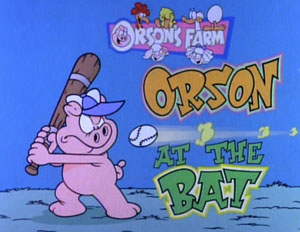 The scene transforms into Orson’s dream world, with Wade providing narration in the meter of the verse of the original poem. The team now plays in a full-sized stadium, though the only fan in the stands seems to be little Sheldon, the chick still inside his eggshell. Competing on the field against the home farmyard team are Orson’s three evil brothers, who pull fielding tricks like scoring an out at first by the second baseman holding up a section of curved pipe to catch the hit ball, and instantly curve it around to shoot out aimed toward first. They rob away a home run by having their fielder walking on stilts at the fence. Roy Rooster hits an unexpected single by twisting his torso into a tight braid, and Wade the Duck (now playing in the dream) winds up at first by reason of a bean ball. Enter Orson as the mighty equivalent of Casey, but also busy at the same time appeasing his appetite by chowing down on pizza pies, submarine sandwiches, etc. The usual ignoring of the first two pitches occurs, Orson relaxing on a lawn chair as the first sails by, and watering a small garden of flowers he has planted upon the baseline while the second strike is registered. A clever rewording of a famous line updates the story to modern times: “‘Kill him. Kill the umpire’, someone shouted long and low – but you cannot kill a person on a TV cartoon show.” Touche, censors and parents’ groups.
The scene transforms into Orson’s dream world, with Wade providing narration in the meter of the verse of the original poem. The team now plays in a full-sized stadium, though the only fan in the stands seems to be little Sheldon, the chick still inside his eggshell. Competing on the field against the home farmyard team are Orson’s three evil brothers, who pull fielding tricks like scoring an out at first by the second baseman holding up a section of curved pipe to catch the hit ball, and instantly curve it around to shoot out aimed toward first. They rob away a home run by having their fielder walking on stilts at the fence. Roy Rooster hits an unexpected single by twisting his torso into a tight braid, and Wade the Duck (now playing in the dream) winds up at first by reason of a bean ball. Enter Orson as the mighty equivalent of Casey, but also busy at the same time appeasing his appetite by chowing down on pizza pies, submarine sandwiches, etc. The usual ignoring of the first two pitches occurs, Orson relaxing on a lawn chair as the first sails by, and watering a small garden of flowers he has planted upon the baseline while the second strike is registered. A clever rewording of a famous line updates the story to modern times: “‘Kill him. Kill the umpire’, someone shouted long and low – but you cannot kill a person on a TV cartoon show.” Touche, censors and parents’ groups.
The immortal third pitch flies – and as in the poem, what is happening elsewhere is recounted, one such place giving viewers an opportunity to turn off the TV channel broadcasting the game, and watch instead their VCR. But Orson has of course struck out, Sheldon passing him to remark “You shoulda swung at the first two.” Suddenly, Orson returns to present times, reviving from the conk on the head. Though his team is down in the game by several hundred runs, Orson states that he’s learmed his lesson, to always stay alert and keep his eye on the ball. It’s Orson’s turn at bat, and the determined pig socks one out of the park on the first swing. But he won’t stop there. Ignoring the batting order, he takes up the bat at home plate again, and hits another – and another, and another… Hours later, Wade shows up to return Orson’s book, to find the whole team roster except for Orson sitting on the bench, falling asleep, as Orson has taken it upon himself to become a one-man team, and is still batting. Wade’s voice-over narration closes with the words, “Oh, somewhere, men are laughing, and somewhere children shriek – but we’re now in extra innings. Mighty Orson’s on a streak!”
• “Orson at the Bat” is the second episode on a flipped but normal-speed half hour on Dailymotion.
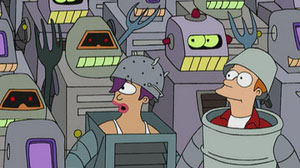 Jumping ahead considerably, just to end this week’s assortment on a high note, we have Fear of a Bot Planet (Film Roman, Futurama, 4/20/99), which finds Fry attending his first Blernsball game at Madison Cube Garden, where the New New York Yankees play the Mars Greenskins. Fry inquires if the sport is the same as baseball from his day, but Leela refers to his sport as “as boring as Mom and apple pie. That’s why they jazzed it up.” Indeed they have, as Fry discovers when the first ball is hit, for what looks like a home run. Fry is surprised when he is the only one who rises from his seat to cheer, while everyone else looks at him as if he is some kind of a kook. Reason? The ball is tethered to a sort of bungee cord, and stops short of leaving the park, springing back on its rope toward home plate. A fielder attempts to grab the ball on its way back, and is dragged along with it and the cord, overshooting the plate and flying past it without tagging, allowing the runner to be called safe – or something like that. Another hit is caught by a fielder on the rise, with the cord continuing to extend into the stands, depositing the fielder in Bender’s metal arm. Bender claims to have caught a souvenir – but hands over the fielder to a young boy in a rare generous gesture to take home. Dr. Zoiberg is at the concession stands, trying to find some kind of food he would know on his home planet. He says he’ll settle for anything crawling with parasites – and receives a hot dog. Its taste is to his liking, and Fry simultaneously remarks, “At least hot dogs haven’t changed.” Bender asks, “Who wants popcorn?”, and, at his friends’ request, heats and pops a bucket full inside his hollow steel belly, then adds butter to it by pushing down on his head antenna like a topping dispenser.
Jumping ahead considerably, just to end this week’s assortment on a high note, we have Fear of a Bot Planet (Film Roman, Futurama, 4/20/99), which finds Fry attending his first Blernsball game at Madison Cube Garden, where the New New York Yankees play the Mars Greenskins. Fry inquires if the sport is the same as baseball from his day, but Leela refers to his sport as “as boring as Mom and apple pie. That’s why they jazzed it up.” Indeed they have, as Fry discovers when the first ball is hit, for what looks like a home run. Fry is surprised when he is the only one who rises from his seat to cheer, while everyone else looks at him as if he is some kind of a kook. Reason? The ball is tethered to a sort of bungee cord, and stops short of leaving the park, springing back on its rope toward home plate. A fielder attempts to grab the ball on its way back, and is dragged along with it and the cord, overshooting the plate and flying past it without tagging, allowing the runner to be called safe – or something like that. Another hit is caught by a fielder on the rise, with the cord continuing to extend into the stands, depositing the fielder in Bender’s metal arm. Bender claims to have caught a souvenir – but hands over the fielder to a young boy in a rare generous gesture to take home. Dr. Zoiberg is at the concession stands, trying to find some kind of food he would know on his home planet. He says he’ll settle for anything crawling with parasites – and receives a hot dog. Its taste is to his liking, and Fry simultaneously remarks, “At least hot dogs haven’t changed.” Bender asks, “Who wants popcorn?”, and, at his friends’ request, heats and pops a bucket full inside his hollow steel belly, then adds butter to it by pushing down on his head antenna like a topping dispenser.
Fry believes he’s getting the hang of this game, relating to Leela, “The blerns are loaded, the count is three blerns and two anti-blerns, and the infield blern rule is in effect, right? Leela responds that, except for the word “blern”, what Fry just said was pure gibberish. Then things go crazy on the field. A batter hits the ball into a hole in the middle of the outfield. A display on the scoreboard reads, “Third Ball Locked”. The excited announcer calls out, “Multiball!”, as three launching devices pivot up from the infield grass, and shoot additional balls at the plate. The batter hits ball after ball into the field, and the fielders scatter everywhere trying to catch them. The batter hops upon a souped-up motorcycle (closely resembling the light cycles from Disney’s “Tron”), and roars around the bases, narrowly avoiding explosions just after he crosses each bag. The announcer shouts in the manner of a soccer announcer, “BLERNNNNNNNNnnnnnnn…..” as the motorcycle crosses home plate. All Fry can do in reaction is scratch his head.
NEXT WEEK: Keeping my batting card in hiding until next week. Be surprised.
